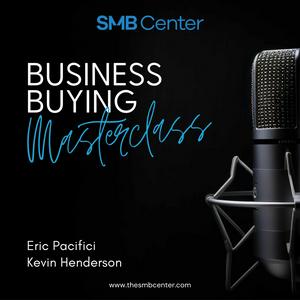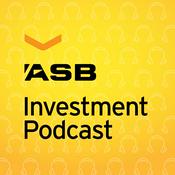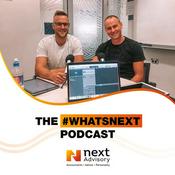11 episodes

Session #11: Financial Due Diligence
06/7/2024 | 15 mins.
Welcome back to the Business Buying Masterclass! In today’s session, we dive into the critical topic of financial due diligence, a cornerstone in the acquisition process. To enrich our discussion, we’ll integrate insights from industry experts Chris Williamson of Cayne Crossing and Elliott Holland of Guardian Due Diligence.Thank you for tuning in to the 11th session of this Business Buying Masterclass. Let’s get started!The Business Buying Masterclass is now part of The SMB Center! 🎉The SMB Center is your go-to destination for essential resources, practical tools, and expert insights tailored to small and medium-sized business entrepreneurs like you. This includes hundreds of articles on business buying (Entrepreneurship Through Acquisition) and valuable tools like our Leveraged Buyout Model and LOI Template — all for FREE.IntroductionCongratulations on making it through the toughest part: getting the seller and broker on board and finalizing your Letter of Intent (LOI).Now that you're under LOI, the seller is willing to lift the proverbial ‘hood’ of the business and provide access to detailed financial information. This is your first look at the data underlying the information provided in the Confidential Information Memorandum (CIM). It’s a crucial phase where the rubber meets the road, offering a real glimpse into the business’s actual performance and financial health.In this session, our goal is to help you navigate the post-LOI deal roadmap, focusing on the essential steps and best practices for conducting financial due diligence. We will explore the nuances of Quality of Earnings (QofE) reports, share expert advice on identifying red flags, and provide actionable tips to ensure you’re making a well-informed decision.Guest ContributorsElliott Holland is the founder and managing director of Guardian Due Diligence, a firm specializing in Quality of Earnings (QofE) for small and medium-sized business (SMB) transactions. With a rich background in private equity and a Harvard MBA, Elliott brings over 20 years of experience in evaluating and managing acquisitions. Guardian Due Diligence has supported numerous entrepreneurs and investors in making informed decisions by providing comprehensive financial due diligence and QofE reports. Elliott is known for his deep understanding of SMB dynamics and his commitment to ensuring clients avoid costly mistakes and uncover potential fraud in their transactions.Chris Williamson is a founding partner of Cayne Crossing, a boutique consulting firm focused exclusively on financial due diligence and Quality of Earnings (QofE) for small and medium-sized businesses (SMBs). With over 20 years of experience and a background in Big Four accounting, Chris has led over 1,000 transactions, providing clients with the insights needed to make informed decisions. Cayne Crossing is renowned for its hands-on approach and deep understanding of the unique challenges in the SMB market. Chris is passionate about entrepreneurship and leverages his extensive experience to help clients navigate the complexities of financial due diligence, ensuring they uncover the true financial health of potential acquisitions.Financial Due Diligence: The First Look Under the HoodFinancial due diligence is the process of verifying the financial information provided by the seller. It aims to confirm that the business's reported earnings, expenses, and assets are accurate and provide a true reflection of its financial health. This process typically includes a thorough review of financial statements, tax returns, customer contracts, and other relevant documents.Chris Williamson of Cayne Crossing emphasizes the importance of this step: "Financial statement quality across SMBs is the wild wild west. There is no concept of Generally Accepted Accounting Principles (GAAP) in this end of the world. This means the baseline of your valuation, EBITDA/SDE, may be totally incorrect and at the mercy of the seller’s (often) biased interpretation of their financial picture.”The Role of a Quality of Earnings (QofE) ReportA Quality of Earnings (QofE) report is a comprehensive financial assessment designed to bridge the gap between the business's financial statements and reality. Here is a clip from Mundane Millionaires of Elliott explaining what a QofE is: Chris further explains that: "A QofE focuses on illustrating the true or 'normalized' state of historical EBITDA and how it bridges to free cash flow. In short, what you receive from a seller or their broker is often an (unintentionally) misconstrued view of the reality of the business you will be taking over."Elliott Holland from Guardian Due Diligence adds, "The financial part of a quality of earnings is somewhat similar deal to deal. The data inputs vary. The work you have to do to get them into a standard format varies. But the output is pretty consistent. If you look at a hundred reputable firms' quality of earnings, we'll structure stuff differently, different levels of depth in the analysis, but they look similar."Key Components of a QofE Report1. Proof of CashOne of the foundational elements of a QofE report is the proof of cash. This step ensures that the financial statements align with actual cash flow. Chris notes, "Proof of cash is step one. Do the financial statements actually agree with the cash that came in and out of the bank accounts? The answer almost always is yes, but we’ve seen times when it doesn’t. This important check helps gauge the operating cash flow of the business."2. EBITDA Adjustments (Add Backs)Understanding and validating EBITDA adjustments is crucial. "What is the normalized revenue and EBITDA of the business? After taking into account everything you’ve learned about the seller’s financial statements, this is where it all comes together in a summary format to tell you what it means," says Chris.3. Working Capital AnalysisAnother critical aspect is the working capital analysis. Chris explains, "Determine the working capital needs of the business and the resulting impacts in relation to how you have structured working capital in your LOI. If you are receiving a normalized level of working capital at closing, this will help you define the peg."Common Pitfalls and How to Avoid ThemElliott shares some of the common pitfalls he has encountered in his practice: "I've seen deals where the seller deposited a million dollars into the bank account and tried to call it revenue with no invoices. Another time, they added every darn thing as an EBITDA adjustment. These fraudulent activities can severely impact the valuation and viability of the business."Here is a Mundane Millionaires clip where Elliott expands on the risks involved: To avoid such pitfalls, it’s essential to:* Hire a reputable QofE provider: Choose a provider with experience in SMB transactions and a strong track record.* Stay objective: Remember that you are no longer an objective party once you are emotionally invested in the deal.* Thoroughly vet the financials: Ensure all financial statements, bank statements, and tax returns are scrutinized for inconsistencies.Expert Advice: Red Flags to Watch ForAccording to Elliott, some red flags to watch for during financial due diligence include:* Significant discrepancies between bank statements and financial statements* Unusually high or low working capital requirements* Inconsistent revenue recognition practices* Large, unexplained adjustments to EBITDAConclusionFinancial due diligence is a critical step in the acquisition process. By thoroughly vetting the business’s financials and leveraging the expertise of seasoned QofE providers, you can uncover potential issues, renegotiate terms, and ensure you are making a sound investment.Thank you for joining us for this session of the Business Buying Masterclass. We hope these insights and expert advice help you navigate your next acquisition with confidence. Now, let’s dive into a recent episode of the Mundane Millionaires podcast featuring Elliott Holland, where he shares more about his experiences and expertise in financial due diligence.Mundane Millionaires: Full Episode with Elliott HollandListen to or watch the full episode today and please leave us a five-star review on your favorite podcasting platform!DisclaimersNow for a few required disclaimers. Sorry in advance!* This course is being presented strictly for educational and informational purposes and not for the purpose of marketing any legal services or seeking legal employment and is not motivated by pecuniary gain.* The opinions stated in this course from the authors represent the opinions of such individual authors and not the opinions of any other person or organization.* Nothing contained in this course or otherwise from the authors hereof is to be interpreted as legal, financial, tax, investment, and/or any other form of advice. Please consult your own legal, financial, tax, investment, and/or other advisors.* The authors are not your lawyers, and no information provided in the course of this class or otherwise has the effect of forming an attorney-client relationship between you and the authors. In short, get your own lawyer!* This course is being presented by The SMB Center LLC and has no affiliation or relationship with SMB Law Group LLP.About the AuthorsEric & Kevin, the authors of this masterclass, have worked for some of the most elite law firms in the world. During their time in BigLaw, they regularly worked on transactions in the hundreds of millions to billion-dollar-plus range for some of the most recognizable companies in the world and have extensive experience with M&A.The authors have since begun investing in select SMB acquisitions and have co-founded an SMB-focused law firm where they’ve collectively worked on billions of dollars in SMB-focused M&A. Get full access to The Business Buying Masterclass at masterclass.thesmbcenter.com/subscribe

Session #10: You're under LOI, Now What?
22/6/2024 | 10 mins.
Thanks for reading The Business Buying Masterclass! Subscribe for free to receive new posts and support my work.IntroductionCongratulations on making it through the toughest part: getting the seller and broker on board and finalizing your Letter of Intent (LOI). Now, where do you go from here?In today's session, our goal is to help you navigate the post-LOI deal roadmap.Before we dive in, remember that no two transactions are the same. Sellers and brokers may have strong opinions about timeframes, due diligence, and the overall deal process. While it's important to be diplomatic, remember that when you're planning to invest millions of dollars, you don't need to walk on eggshells. Always protect yourself against those dreaded busted deal fees!Most transactions follow a similar cadence. Here are the general steps:* Conducting Financial Due Diligence (and Renegotiating Terms!)* Business Due Diligence* Securing Your Financing (SBA or Conventional)* Negotiating with Potential Investors (From Term Sheet to Subscription)* Legal Due Diligence* Negotiating Agreements* Closing* Post-Closing ConsiderationsAs you navigate each step, it’s crucial to see the big picture and keep track of what still needs to be done.Thank you for tuning in to the 10th session of this Business Buying Masterclass. Let’s get started! The Business Buying Masterclass is now part of The SMB Center! 🎉The SMB Center is your go-to destination for essential resources, practical tools, and expert insights tailored to small and medium-sized business entrepreneurs like you. This includes hundreds of articles on business buying (Entrepreneurship Through Acquisition) and valuable tools like our Leveraged Buyout Model and LOI Template — all for FREE.The Change in Leverage PositionsOnce you're under an LOI with exclusivity, typically for 60 to 90 days (always ask for 90!), the leverage shifts in your favor as the buyer.The seller is forced to remove the business from the market, granting you a unique position of influence—they are desperate to close the deal and you’re the only game in town!This exclusivity period is crucial as it allows you to thoroughly evaluate the business without the pressure of competing offers.Move expeditiously through this period… time kills deals!Conducting Financial Due Diligence (and Renegotiating Terms!)Now you get to open the hood and see what you're really buying!We strongly recommend hiring a quality of earnings (QoE) provider that has an offering tailored for SMBs.There are many… send us a message for recommendations!You want to ensure that the numbers from the Confidential Information Memorandum (CIM) tie out to reality through a proof of cash and double-check that the add-backs are bona fide.You’ll also want to smoke out issues like customer and supplier concentration, and declining financial performance.A little insider baseball:As of June 2024, about 60% of deals need to be renegotiated post-QoE or financial due diligence.A common trap for the unwary is when financially sophisticated clients attempt to conduct their own QoE.These transactions move fast, often involve poor bookkeeping, and inexperienced sellers. It’s better to let the experts handle it.Also, working capital is often overlooked, and we'll do a deeper dive on this later in the course.Business Due DiligenceNow, you need to get familiar with the operations of the business and confirm that you are properly equipped to run this type of business!This means assessing everything from your ability to work with the type of employees in the business (who are often very blue-collar), to technical insider lingo and navigating industry diplomacy.Understanding the day-to-day operations and the company's culture will help ensure a smoother transition.Securing Your Financing (SBA or Conventional)Securing financing is a key early step in the acquisition process.Your goal: obtain a term sheet and commitment letter from an SBA 7(a) lender or conventional financing source.There are many great lenders who specialize in large acquisition financing, and many excellent brokers who can assist in securing the financing.Evaluating both SBA and conventional financing options will help you choose the best fit for your acquisition.Negotiating with Potential Investors (From Term Sheet to Subscription)Next, and likely simultaneously with your financing, you’ll want to have a meeting of the minds with your prospective investors.They will look at you, the business, the acquisition terms, and the investment terms (more on this in future issues).The goal is to get those investors to sign subscription documents and wire funds.These investments are almost always governed by Regulation D, including Rule 506(b) and 506(c), and all investors should typically be accredited.Pro tip! If you have a good deal, you will almost always find investors to support your acquisition. Don’t be afraid to chase a larger target than you might be able to afford on your own, as you’ll get the necessary down payment money!Did you know that Kevin and Eric host a podcast called Mundane Millionaires?Each week, we publish audio and video interviews with incredible entrepreneurs just like you who are building time and financial wealth through entrepreneurship.In our latest episode, we sat down with Nolan Gore, owner of Top Choice Lawn Care. Nolan shares his journey from serving in the Marine Corps to acquiring and expanding a struggling lawn care business in Austin, Texas. He discusses the challenges of scaling a business from $1.5 million to over $8 million in revenue, emphasizing the different skill sets required at various stages of growth.Listen to or watch the latest episode today and please leave us a five-star review on your favorite podcasting platform!Legal Due DiligenceNext, your attorneys will do a deep dive into the legal elements of the target.The goal is to ensure that the target company is legally sound and that the transaction is structured such that the assets or equity you aim to acquire are transferable.They’ll also verify that the business isn’t facing lawsuits and that the assets are not encumbered by liens.Thorough legal due diligence helps prevent future legal complications.Negotiating AgreementsYour counsel will negotiate the legal documents, from the purchase agreement to ancillary agreements, employment agreements, promissory notes, etc.This process can range from very simple to very complex, depending on the specifics of the deal.Clear communication and experienced legal guidance are key to successfully navigating this stage.ClosingThe closing process involves getting all documents signed and implementing the transaction.This includes finalizing the purchase agreement, ensuring all conditions precedent are met, and transferring ownership.A smooth closing is the culmination of all your due diligence and negotiations, resulting in the official transfer of the business.Post-Closing ConsiderationsPost-closing, there are several considerations to ensure the ongoing success of the business.These include implementing employee handbooks, improving customer and supplier agreements, and cleaning up the holding company structure.Addressing these areas will help solidify your ownership and set the stage for future growth.We’ll cover each of these topics in depth in future issues!DisclaimersNow for a few required disclaimers. Sorry in advance!* This course is being presented strictly for educational and informational purposes, and not for the purpose of marketing any legal services or seeking legal employment and is not motivated by pecuniary gain.* The opinions stated in this course from the authors represent the opinions of such individual author and not the opinions of any other person or organization.* Nothing contained in this course or otherwise from the authors hereof is to be interpreted as legal, financial, tax, investment and/or any other form of advice. Please consult your own legal, financial, tax, investment and/or other advisors.* The authors are not your lawyer, and no information provided in the course of this class or otherwise has the affect of forming an attorney-client relationship between you and the authors. In short, get your own lawyer!* This course is being presented by The SMB Center LLC and has no affiliation or relationship SMB Law Group LLP.About the AuthorsThe authors have worked for some of the most elite law firms in the world. During their time in BigLaw, they regularly worked on transactions in the hundreds of millions to billion dollar plus range for some of the most recognizable companies in the world and have extensive experience with M&A.The authors have since begun investing in select SMB acquisitions and have co-founded an SMB-focused law firm where they’ve collectively worked on billions of dollars in SMB-focused M&A. Get full access to The Business Buying Masterclass at masterclass.thesmbcenter.com/subscribe

Session #9: The Masterclass is Back! A Recap
16/9/2023 | 11 mins.
After a short break for the Summer, the Business Buying Masterclass is back.And, we couldn’t be more excited to continue this journey with you!In today’s session, we’ll recap the topics we’ve covered in the class thus far and give an outline of what’s to come! Spoiler alert: We have poured time into building out the rest of the masterclass and we’re super excited for what’s to come. We’re going to cover everything—due diligence, business valuation, debt financing, attracting investors, negotiating deal documents, holding company considerations, tax matters, war stories and so much more! Thanks for coming back for this 9th Session of this Business Buying Masterclass!Did you know that Kevin and Eric have launched a new podcast called Mundane Millionaires?Each week, we publish and audio and video podcast of interviews with incredible entrepreneurs just like you who building time and financial wealth as entrepreneurs.Last week, we sat down with Raleigh Williams, a former big law lawyer turned entrepreneur, who had a whopping $26 million exit.Listen to or watch the latest episode today and please leave us a five star review on your favorite podcasting platforms! Get full access to The Business Buying Masterclass at masterclass.thesmbcenter.com/subscribe

Session #8: Offer Diplomacy
29/7/2023 | 9 mins.
You’ve made several offers but keep coming in second place. What now? In today’s session, our goal is to help you master the art of crafting and presenting an LOI that does more than just get you noticed—it makes you memorable.To do that, we’re going to keep this session simple, with a straight-to-the-point list of seven ways to improve your LOI’s chances. Thanks for tuning in to the 8th Session of this Business Buying Masterclass!Did you know that Kevin and Eric have launched a new podcast called Mundane Millionaires?Each week, we publish and audio and video podcast of interviews with incredible entrepreneurs just like you who building time and financial wealth as entrepreneurs.This week, we sat down with John Seiffer, an experienced small business advisor and the Founder of CEO Boot Camp. John has over 40 years of small business experiencing, from founding a company of his own to working with hundreds of small business owners as an advisor.Listen to or watch the latest episode today and please leave us a five star review on your favorite podcasting platforms! Get full access to The Business Buying Masterclass at masterclass.thesmbcenter.com/subscribe

Session #7: Contents of a Letter of Intent
15/7/2023 | 26 mins.
The M&A Masterclass is a reader-supported publication. To receive new posts and support my work, consider becoming a free or paid subscriber.IntroductionSo, you’ve found a business you like and you’re ready to make your first offer?But how? And what should it include?We’re glad you asked! In this session, we’ll walk through the structure and contents of a letter of intent (often referred to as an LOI).Our goal in today’s session is to arm you with the information you need to develop an effective offer that both improves your chance of success while simultaneously protecting your interests.Thanks for tuning in to the 7th Session of this Business Buying Masterclass!Did you know that Kevin and Eric have launched a new podcast called Mundane Millionaires?Each week, we publish and audio and video podcast of interviews with incredible entrepreneurs just like you who building time and financial wealth as entrepreneurs.This week, we sat down with Katherine Dextraze, who recently acquired Your Solar Mate. Katherine’s path to entrepreneurship includes degrees in nuclear engineering and medical physics, and 11th hour busted deal, and a successful closing process that included her wedding right in the middle!Listen to or watch the latest episode today and please leave us a five star review on your favorite podcasting platforms! Get full access to The Business Buying Masterclass at masterclass.thesmbcenter.com/subscribe
More Business podcasts
Trending Business podcasts
About Business Buying Masterclass Podcast
Listen to Business Buying Masterclass Podcast, Friends That Invest and many other podcasts from around the world with the radio.net app

Get the free radio.net app
- Stations and podcasts to bookmark
- Stream via Wi-Fi or Bluetooth
- Supports Carplay & Android Auto
- Many other app features
Get the free radio.net app
- Stations and podcasts to bookmark
- Stream via Wi-Fi or Bluetooth
- Supports Carplay & Android Auto
- Many other app features


Business Buying Masterclass Podcast
download the app,
start listening.




































